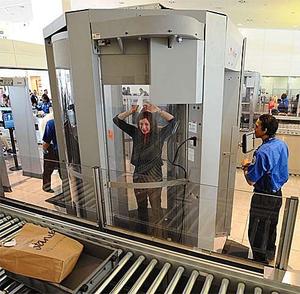A closer look//By: Eugene K. ChowGrowing ubiquity of X-ray scanners could pose public health risk
Body scanners are now routinely deployed in airports, border check points, and even the streets of some American cities; with the use of X-ray scanners by law enforcement agencies becoming increasingly commonplace, health advocates worry that the additional radiation exposure could pose a health risk; repeated exposures to low-doses of radiation can lead to cancer; currently federal health standards are primarily limited to medical X-rays and since the body scanners do not fall under this category, the decision on where and how to use the devices is entirely up to security officials

Repetitive scanning raising health concerns // Source: sg.hu
With the use of X-ray scanners by law enforcement agencies becoming increasingly commonplace, health advocates worry that the additional radiation exposure could pose a health risk.
Body scanners are now routinely deployed in airports, border check points, and even the streets of some American cities. In contrast, up until a decade ago, many states had laws prohibiting the use of X-rays on individuals for anything other than a medical exam, and many countries still maintain this practice.
In the late 1990s, when prisons first began using X-ray machines to scan inmates for contraband items, the Food and Drug Administration (FDA) convened an advisory panel that warned ending the practice of only using X-rays for medical purposes would open up a dangerous slippery slope.
“This is exactly what I was afraid was going to happen back when we had the FDA meetings,” said Kathleen Kaufman, the former radiation management director of Los Angeles County and a member of the FDA’s advisory board on radiation, in reference to the growing use of X-ray machines for non-medical purposes.
The increasing ubiquity of these machines is particularly problematic as they are largely unregulated. Federal health standards are limited to medical X-rays and since the body scanners do not fall under this category, the decision on where and how to use the devices is entirely up to security officials.
With no oversight, Kaufman, like other scientists, is concerned about the potential health hazards that result from radiation exposure.
“Even though it’s a very small risk, when you expose that number of people, there’s a potential for some of them to get cancer,” Kaufman said.
Studies have indicated that as many as 100 U.S. airline passengers each year could get cancer as a result of the machines, but Transportation Security Administration (TSA) officials insist that the machines are entirely safe as they only emit trace amounts of radiation.
“It’s a really, really small amount relative to the security benefit you’re going to get,” saidRobin Kane, the TSA”s assistant administrator for security technology. “Keeping multiple technologies in play is very worthwhile for the United States in getting that cost-effective solution — and being able to increase the capabilities of technology because you keep everyone trying to get the better mousetrap.”
Little research has been done on the long-term health effects of the body scanners commonly deployed in U.S. airports, and the existing tests conducted by the TSA have largely been criticized for lacking proper methodology
